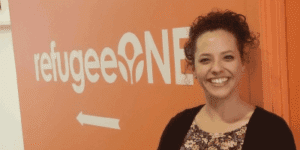Refugee Resettlement Programs Deserve Support From Higher Education
By Matthew Swinehart
By the end of 2016, the number of displaced persons reached an astounding 65.6 million people, and 85,000 refugees were resettled in the United States. So far in 2017, the number of displaced persons has continued to climb while the number of refugees slated to be resettled in the United States has been slashed dramatically to 45,000. To me, this shows a lack of understanding about refugee resettlement programs, and, worse yet, an unacceptable fear of the other.
million people, and 85,000 refugees were resettled in the United States. So far in 2017, the number of displaced persons has continued to climb while the number of refugees slated to be resettled in the United States has been slashed dramatically to 45,000. To me, this shows a lack of understanding about refugee resettlement programs, and, worse yet, an unacceptable fear of the other.
I believe that fear of the other is anathema to education. As an advocate for civic education, I believe that it is only through others that we can learn; that through engaged civic participation we come to see the value in other perspectives; that communities are made better through inclusive discourse.
I believe in the value of refugee resettlement programs, I believe in the value that campus can add to them, and I believe that higher education should take a strong stance against fear of the other.

With the recent passing of Ed Silverman, whose nearly four-decade-long stewardship of Illinois’ Bureau of Refugee and Immigrant Services cemented the state as a national leader in refugee resettlement, I think that now is a good time to reflect upon what higher education institutions in Illinois can do to support refugee resettlement efforts.
At ILCC, I am lucky to be connected to an ever growing group of VISTA alumni who go on to great things. One of the 2016-2017 VISTAs, Janice Ayarzagoitia, has gone on to work at a Chicago-area refugee resettlement organization called RefugeeOne.
** Click here to learn more about Janice Ayarzagoitia and the ILCC VISTA Program! **
RefugeeOne is the largest refugee resettlement organization in Illinois, and has assisted more than “17,500 refugees fleeing war, terror, and persecution to build new lives of safety, dignity, and self-reliance.” The organization works to find housing and employment for hundreds of refugees a year. On top of this, RefugeeOne acts as an education hub where recently resettled people can come to learn english and study American civic structure and culture.

To offer these services to new arrivals, RefugeeOne relies upon local volunteers and recurring contributors, and many of them come from college campuses. Students are often drawn to this kind of work because through RefugeeOne they get to hone their instructional and language skills while doing good work in their community.
Universities across Illinois have lent their voice to the refugee crisis as well. Four Illinois universities including Illinois Institute of Technology, Illinois State University and DePaul University became a part of a consortium of 57 worldwide colleges and universities that have offered direct aid to Syrian students for scholarships.
These efforts are a great start, and I hope to see them built upon. The college and university campus is such a wonderful place of opportunity. Together students, staff and faculty can come together and help new arrivals to reach their potential with the aid of a welcoming community. In turn, I believe our communities will grow stronger as a result.
If you believe as I do consider reaching out to a local Refugee Resettlement program like RefugeeOne, and ask how your campus can get involved in the process.
Here are a few ideas to get you started:
Employment
- The college/university campus is a big machine, and it employs a lot of people!
- Many Refugees coming to the states are highly skilled, and could be a great addition to your campus staff! Ask refugee resettlement agencies about their clients under-employed
- Campuses make use of many catering, IT, and landscaping contractors to function. Consider referring these employers to refugee resettlement programs!
Education
- The campus is full of students looking for ways to make a difference. Consider beginning a student volunteer referral program for your local refugee resettlement program!
Civic Programming
- The campus is also a great venue to hold a community awareness session! Consider inviting local refugee resettlement coordinators to lead a discussion with the local community about how the process works, and how they can help.
Does your campus have existing programming about ongoing refugee resettlement efforts in Illinois? We’d love to hear about them! Fill out the form below to share your story!
 VISTA Contributions
VISTA Contributions 

